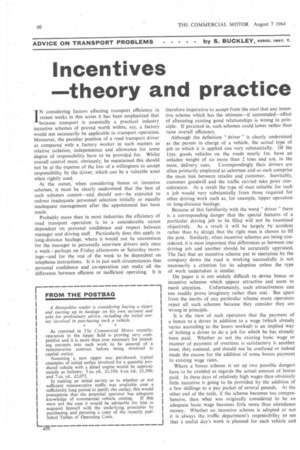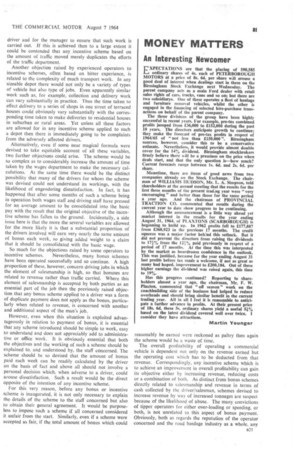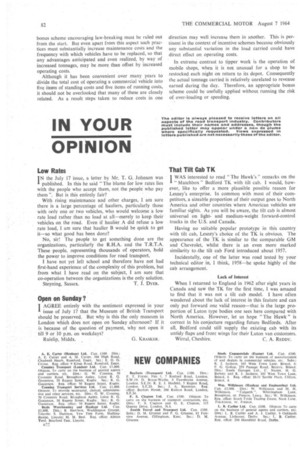Incentives —theory and practice
Page 82

Page 83

Page 84

If you've noticed an error in this article please click here to report it so we can fix it.
IN considering factors affecting transport efficiency in recent weeks in this series it has been emphasized that because transport is essentially a practical industry incentive schemes of proved worth within, say, a factory would not necessarily be applicable to transport operation. Moreover, the peculiar position of a road transport driver as compared with a factory worker in such matters as relative isolation, independence and allowance for some degree of responsibility have to be provided for. Whilst overall control must, obviously, be maintained this should not be at the expense of the loss of a willingness to accept responsibility by the driver, which can be a valuable asset when rightly used.
At the outset, when considering bonus or incentive schemes, it must be clearly understood that the best of such schemes cannot—and should not—be expected to redress inadequate personnel selection initially or equally inadequate management after the appointment has been made.
Probably more than in most industries the efficiency of road transport operation is to a considerable extent dependent on personal confidence and respect between manager and driving staff. Particularly does this apply in long-distance haulage, where it would not be uncommon for the manager to personally interview drivers only once a week—perhaps on Friday afternoons or Saturday mornings—and for the rest of the week to be dependent on telephone instructions. It is in just such circumstances that personal confidence and co-operation can make all the difference between efficient or inefficient operating. It is therefore imperative to accept from the start that any incentive scheme which has the ultimate—if unintended—effect
of alienating existing good relationships is wrong in principle. If persisted in, such schemes could lower rather than raise overall efficiency.
Although the definition " driver " is clearly understood as the person in charge of a vehicle, the actual type of job to which it is applied can vary substantially. Of the 14m. goods vehicles on the roads nearly 1m. have an unladen weight of no more than 2 tons and are, in the main, delivery vans. Correspondingly their drivers are often primarily employed as salesmen and as such comprise the main link between retailer and customer. Inevitably, customer goodwill and the traffic carried take prior con-sideration. As a result the type of man stiitable for such a job would vary substantially from those required for other driving work such as, for example, tipper operation or long-distance haulage.
Because of this familiarity with the word " driver " there is a corresponding danger that the special features of a
particular driving job to be filled will not be examined
objectively. As a result it will be largely by accident rather than by design that the right man is chosen to fill
the post. Similarly, when incentive schemes are being con sidered, it is most important that differences as between one driving job and another should be accurately appraised.
The fact that an incentive scheme put in operation by the company down the road is working successfully is not necessarily a criterion for its adoption unless the type of work undertaken is similar.
On paper it is not unduly difficult to devise bonus or incentive schemes which appear attractive and seem to
merit attention. Unfortunately, such attractiveness can too readily prove imaginary rather than real. But apart from the merits of any particular scheme many operators reject all such schemes because they consider they are wrong in principle.
It is the view of such operators that the payment of a bonus to a driver in addition to a wage (which already varies according to the hours worked) is an implied way of bribing a driver to do a job for which he has already been paid. Whether or not the existing basic wage or
manner of payment of overtime is satisfactory is another issue, they contend, and should not be confused or indeed made the excuse for the addition of some bonus payment to existing wage rates.
Where a bonus scheme is set up two possible dangers have to be avoided as regards the actual amount of bonus paid. In these days of relatively high wages then obviously little incentive is going to be provided by the addition of a few shillings to a pay packet of several pounds. At the other end of the scale, if the scheme becomes too compre hensive, then what was originally considered to be an adequate basic wage becomes little more than attendance money. Whether an incentive scheme is adopted or not it is always the traffic department's responsibility to see that a useful day's work is planned for each vehicle and driver and for the manager to ensure that such work is carried out. If this is achieved then to a large extent it could be contended that any incentive scheme based on the amount of traffic moved merely duplicates the efforts of the traffic department.
Another objection raised by experienced operators to incentive schemes, often based on bitter experience, is related to the complexity of much transport work. In any sizeable depot there would not only be a variety of types of vehicle but also type of jobs. Even apparently similar work such as, for example, collection and delivery Work can vary substantially in practice. Thus the time taken to effect delivery to a series of shops in one street of terraced houses could obviously vary substantially with the corresponding time taken to make deliveries to residential houses in suburban or rural areas. Yet unless all these factors are allowed for in any incentive scheme applied to such a depot then there is immediately going to be complaints from the adversely affected drivers.
Alternatively, even if some near magical formula were devised to take equitable account of all these variables, two further objections could arise. The scheme would be so complex as to considerably increase the amount of time taken by the wages department to make the necessary calculations. At the same time there would be the distinct possibility that many of the drivers for whom the scheme was devised could not understand its workings, with the likelihood of engendering dissatisfaction. In fact, it has happened that after some months of such a scheme being in operation both wages staff and driving staff have pressed for an average amount to be consolidated into the basic pay with the result that the original objective of the incentive scheme has fallen to the ground. Incidentally, a side issue here is that the more the several variables are allowed_ for the more likely it is that a substantial proportion of the drivers involved will earn very nearly the same arnount of bonus each week, so giving added weight to a claim that it should be consolidated with the basic wage.
So much for the objections raised by some operators to incentive schemes. Nevertheless, many bonus schemes have been operated successfully and so continue. A high proportion of these, however, concern driving jobs in which the element of salesmanship is high, so that bonuses are related to revenue rather than traffic carried. Where this element of salesmanship is accepted by both parties as an essential part of the job then the previously raised objection that any bonus scheme applied to a driver was a form of duplicate payment does not apply as the bonus, particularly when related to revenue, is concerned with another and additional aspect of the man's job.
However, even when this situation is exploited advantageously in relation to payment of bonus, it is essential that any scheme introduced should be simple to work, easy to understand and does not appreciably add to administrative or office work. It is obviously essential that both the objectives and the working of such a scheme should be explained to, and understood by, the staff concerned. The scheme should be so devised that the amount of bonus paid each week can be readily calculated by the driver on the basis of fact and above all should not involve a personal decision which, when adverse to a driver, could arouse dissatisfaction. Such a result would be the direct opposite of the intention of any incentive scheme.
For this very reason, before any bonus or incentive scheme is inaugurated, it is not only necessary to explain the details of the scheme to the staff concerned but also to obtain their general agreement. It would be purposeless to impose such a scheme if all concerned considered it unfair from the start. Similarly, even if a scheme were accepted as fair, if the total amount of bonus which could reasonably be earned were reckoned as paltry then again the scheme would be a waste of time.
The overall profitability of operating a commercial vehicle is dependent not only on the revenue earned but the operating cost which has to be deducted from that revenue. Correspondingly, any incentive scheme which is to achieve an improvement in overall profitability can gain its objective either by increasing revenue, reducing costs or a combination of both. As distinct from bonus schemes directly related to salesmanship and revenue in terms of cash collected by the driver/salesman, schemes devised to increase revenue by way of increased tonnages are suspect
because of the likelihood of abuse. The many convictions of tipper operators for either over-loading or speeding, or both, is not unrelated to this aspect of bonus payment. Obviously, both as regards the reputation of the operator concerned and the road haulage industry as a whole, any
bonus scheme encouraging law-breaking must be ruled out from the start. But even apart from this aspect such practices must substantially increase maintenance costs and the frequency with which vehicles have to be replaced, so that any advantages anticipated and even realized, by way of increased tonnages, may be more than offset by increased operating costs. Although it has been convenient over many years to divide the total cost of operating a commercial vehicle into five items of standing costs and five items of running costs, it should not be overlooked that many of these are closely related. As a result steps taken to reduce costs in one direction may well increase them in another. This is pertinent in the context of incentive schemes because obviously any substantial variation in the load carried could have direct effect on operating costs.
In extreme contrast to tipper work is the operation of mobile shops, when it is not unusual for a shop to be restocked each night on return to its depot. Consequently the actual tonnage carried is relatively unrelated to revenue earned during the day. Therefore, an appropriate bonus scheme could be usefully applied without running the risk of over-loading or speeding.
























































































































